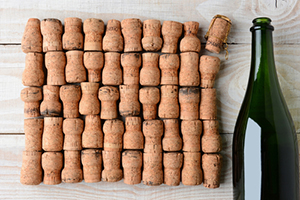 Now you’ve probably heard some contradicting facts about cardiovascular health and alcohol consumption.
Now you’ve probably heard some contradicting facts about cardiovascular health and alcohol consumption.
Some claim that alcohol prevents stroke and heart attack, while other studies swear against it as the worst medicine.
But there is a fundamental flaw with all these studies (for and against alike). So in a new study published in the British Medical Journal, these flaws were taken on, delivering shocking results.
Up to now, you have probably heard that light to moderate drinking lowers your cardiovascular risks compared to abstaining from alcohol altogether.
Accordingly, your daily glass of wine or your cocktail protects your heart from the damage that those non-drinkers experience.
It is true that some studies demonstrate that light drinking (around 120 to 250 milliliters of ethanol per week) is heart healthier than drinking no alcohol at all. For example, in a 2011 review of the scientific literature, authors of an article in the British Medical Journal concluded that people who took one to two drinks per day had the lowest risk of coronary heart disease, while those who drank one drink per day had the lowest risk of stroke. They obtained these results from the average findings of 86 previous studies.
There are, however, some major problems with studies that link alcohol consumption with health risks. Think about the following:
• Such studies must rely on their subjects to report their alcohol consumption accurately. If the subjects remember incorrectly or lie about the amount of alcohol they consume, the studies’ conclusions will be wrong.
• Relying on their subjects’ self-reported alcohol use gives such studies no way to record the details of those who used to drink a lot before cutting down. They will be recorded as drinking almost nothing, while their past use makes it more appropriate to record them as fairly heavy drinkers.
• People who choose to drink only lightly may skew the result by having other healthy habits that protect them from cardiovascular disease. For instance, they may choose healthier diets and exercise programs than people who drink a lot.
As a result of these problems, scientists needed to find a way to identify non-drinkers without relying on self-reports. They also needed to ensure that their light drinkers weren’t the generally healthy lifestyle types.
In July 2014, 155 scholars from all over the world carried out a huge literature review of 56 studies with a total of 261,991 subjects to explore the relationship between alcohol consumption and cardiovascular health while excluding these research problems. They published their results in the British Medical Journal.
Instead of trusting subjects to report their own drinking habits accurately, these researchers isolated people with a gene that made them either drink extremely little or abstain from alcohol altogether.
People who inherit this gene avoid alcohol because it makes them feel nauseous and flushed. According to this study, on average, they drink 17 percent less than people who do not carry the gene. By isolating this group, the authors managed to identify a non-drinking population whose cardiovascular profile they could compare with that of light and moderate drinkers.
The comparison between the drinkers and the non-drinkers showed that the latter group had lower blood pressure, a lower body mass index, a smaller waist circumference, a lower likelihood of ischemic stroke, and a 10 percent lower risk of coronary heart disease.
This turns the conventional wisdom on its head. Light drinkers may have a smaller risk of heart disease and stroke than heavy drinkers, but it seems like non-drinkers are still better off.
Still it doesn’t seem to be a big risk from having a drink or two a few times per week. Just avoid binging or daily drinking. And absolutely, if you don’t drink in the first place, don’t start just to follow some ambiguous studies.

 Overcoming IBD
Overcoming IBD Multiple Sclerosis
Multiple Sclerosis Banishing Bronchitis
Banishing Bronchitis Gum Disease Gone
Gum Disease Gone Overcoming Onychomycosis
Overcoming Onychomycosis Neuropathy No More
Neuropathy No More The Prostate Protocol
The Prostate Protocol Brain Booster
Brain Booster
 Ironbound
Ironbound
 Solution for Shingles
Solution for Shingles
 The Bone Density Solution
The Bone Density Solution
 The Ultimate Healing Protocol
The Ultimate Healing Protocol
 The Parkinson's Protocol
The Parkinson's Protocol
 The Chronic Kidney Disease Solution
The Chronic Kidney Disease Solution
 Overthrowing Anxiety
Overthrowing Anxiety The Fatty Liver Solution
The Fatty Liver Solution The Hypothyroidism Solution
The Hypothyroidism Solution
 The End of Gout
The End of Gout The Blood Pressure Program
The Blood Pressure Program
 The Oxigized Cholesterol Strategy
The Oxigized Cholesterol Strategy
 Stop Snoring And Sleep Apnea Program
Stop Snoring And Sleep Apnea Program
 The Arthritis Strategy
The Arthritis Strategy The Vertigo & Dizziness Program
The Vertigo & Dizziness Program The 3-Step Diabetes Strategy
The 3-Step Diabetes Strategy Hemorrhoids Healing Protocol
Hemorrhoids Healing Protocol The Erectile Dysfunction Master
The Erectile Dysfunction Master Weight Loss Breeze
Weight Loss Breeze The IBS Program
The IBS Program The Insomnia Program
The Insomnia Program The Migraine and Headache Program
The Migraine and Headache Program The Neck Pain Solution
The Neck Pain Solution The Menopause Solution
The Menopause Solution The Ejaculation Master
The Ejaculation Master The TMJ Solution
The TMJ Solution The Acid Reflux Solution
The Acid Reflux Solution The Fibromyalgia Solution
The Fibromyalgia Solution The Psoriasis Strategy
The Psoriasis Strategy
IT IS BETTER YOU ABSTAIN FROM DRINKING IF YOU CANNOT MAINTAIN LIGHT DRINKING HABIT. AND ALSO, THE PROBLEM IS HOW TO ESTABLISH THE LIGHT DRINKING HABIT. IT HAS TO BE DEFINED.
why drink ijn the first place i like the non drinkers results at least its accurate the wine at communion service at church is sufficient once monthly